
The data from the phase III EXPAND study indicated to the researchers that this risk reduction obtained with siponimod was substantially isolated from MS relapse.

The data from the phase III EXPAND study indicated to the researchers that this risk reduction obtained with siponimod was substantially isolated from MS relapse.

New research highlights the need for early identification of traumatic brain injury as well as an interdisciplinary approach to determining treatment strategies.
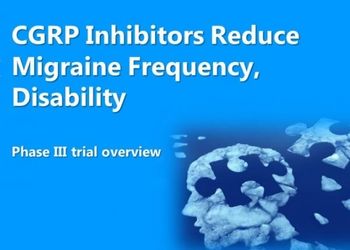
A new class of injectable monoclonal antibodies directed against calcitonin gene related peptide (CGRP) or its receptor may offer hope to migraineurs who have not found effective prophylactic therapy.

Noninvasive neuromodulation therapy shows promise in treating hand tremors associated with essential tremor.
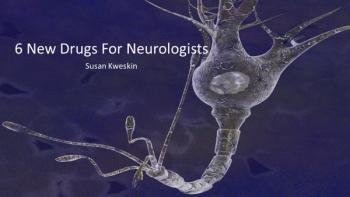
Newly approved medications for various types of pain, generalized myasthenia gravis, and Parkinson disease will be fodder for discussion at AAN 2018. Here’s a brief overview of the therapies the FDA has approved within the past 6 months.

The calcitonin gene-related peptide inhibitor lowered monthly migraine days by ≥50% in 30.3% of patients compared to 13.7% on placebo.
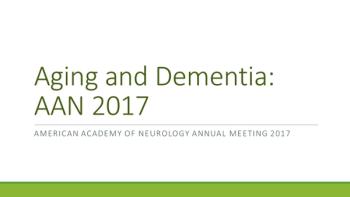
Studies examined the impact of blood pressure trajectories on dementia risk and explored the relationship between sleep apnea and Aβ accumulations.
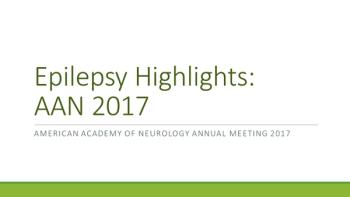
Highlights: imaging the temporal dynamics & cellular architecture of seizures in Dravet syndrome, & reducing risk of spontaneous fetal loss.

Blood protein analysis of plasma total tau has diagnostic use in Alzheimer disease. Could the same hold true for CTE?
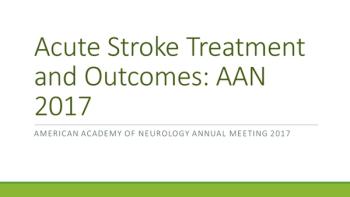
The effect of blood pressure on IAT safety and benefit and pediatric stroke outcomes based on treatment were some of the studies presented at AAN.
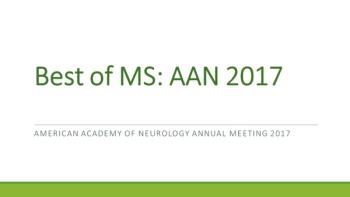
The four top-scoring MS abstracts submitted for AAN 2017 included 6-year outcomes with alemtuzumab treatment and pediatric MS environmental risk factors.

Peter Goadsby, MD discusses the efficacy, safety, & tolerability of the CGRP inhibitor erenumab in a phase III trial of participants with episodic migraine.

The new SUDEP guidelines, co-developed by the AAN & AES and presented this week at the AAN Annual Meeting, provide clarity to health professionals.
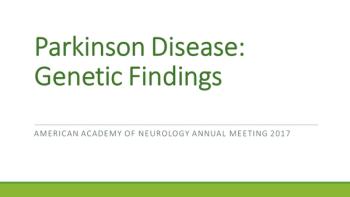
Research at AAN 2017 highlights research of genes that may help predict the likelihood of developing Parkinson disease and progression of the disease.

What was the impact of add-on cannabidiol treatment in patients aged 2-55 years experiencing drop seizures?

You won’t want to miss these new features and sessions at this year’s American Academy of Neurology Annual Meeting, April 22-28, in Boston, MA.

Can we see changes in the brain that correspond to cognitive difficulties? Research presented at AAN 2016 offers compelling information.

In a proof-of-concept study, 25 patients were exposed to a dose-escalating infusion of SAGE-547 to evaluate the drug’s effect on essential tremor.

Researchers used simulations to predict the outcomes of epilepsy patients with partial-onset seizures converting to Aptiom monotherapy (800 mg QD).

Research leading up to the ongoing phase 3 trial of SAGE-547, a potential drug for super-refractory status epilepticus, was presented at AAN 2016.

Do you and your patients with epilepsy agree on treatment decisions? A national survey compares AED attribute preferences of patients and neurologists.
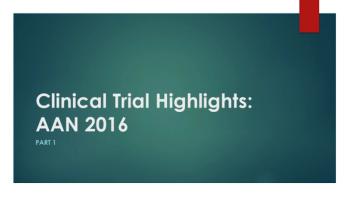
From no evidence of disease activity in MS to studies of a new treatment for periodic paralysis, AAN 2016 featured many exciting clinical trials.

In addition to Guillain-Barré syndrome, a small study from Brazil discussed Zika virus and a possible tie to another autoimmune disorder at AAN 2016.
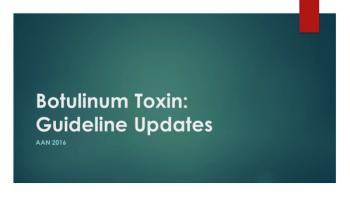
Two authors of the updated AAN guidelines for treatment with botulinum neurotoxin discussed their findings and potential avenues of further research.

How do you respond when a patient with epilepsy asks about the safety of pregnancy? The WEPOD study investigated pregnancy outcomes and deliveries.

Can use of an online platform improve patient self-management in a group of Veterans with epilepsy?

Does traumatic brain injury (TBI) inevitably lead to psychiatric disorders? Research presented at AAN 2016 aimed to quantify the risk of psychiatric illness after TBI.

Researchers studied the prevalence and incidence of epilepsy in the elderly and confirmed three risk factors in this patient population.

Interactive case study discussions highlighted the issue that treating multiple sclerosis often involves swimming murky waters.

To improve the quality of care for patients with epilepsy, AAN updated a set of measures and guidelines in 2014, but does a gap still exist?